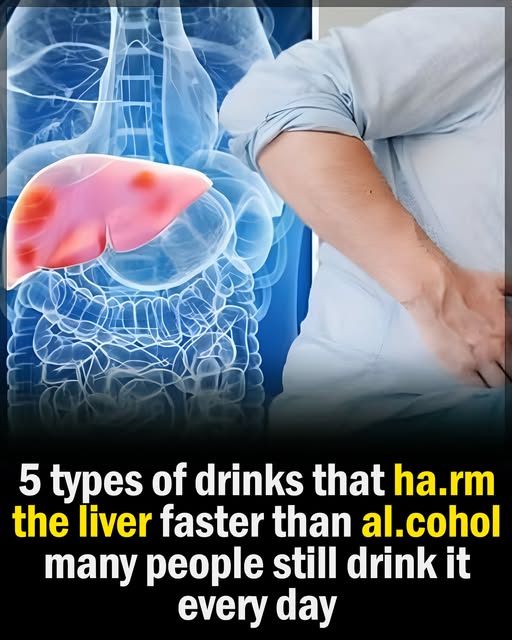You should have known this sooner.

1. Sugary Soft Drinks (Sodas)
These include popular carbonated beverages like cola or fruit-flavored sodas. They are packed with high amounts of fructose or high-fructose corn syrup, which overloads the liver and contributes to non-alcoholic fatty liver disease (NAFLD). Over time, this can lead to inflammation, scarring (fibrosis), and even cirrhosis.
👉 Many people drink these with meals or as a refreshment, unaware of the silent liver damage.
2. Energy Drinks
These are marketed as performance or focus boosters, but many are filled with caffeine, sugar, and artificial stimulants. Excessive consumption may lead to liver toxicity and even acute liver failure in rare cases. Some ingredients can interact poorly with medications or cause stress to liver enzymes.
👉 Students, athletes, and workers often drink these regularly without considering the long-term health effects.
3. Sweetened Iced Tea and Bottled Juices
These drinks seem healthier than sodas but are often loaded with added sugars and preservatives. Store-bought fruit juices and teas lack the fiber of whole fruits and can lead to spikes in blood sugar and fat buildup in the liver. Over time, this contributes to fatty liver disease and insulin resistance.
👉 People trying to “eat healthy” may unknowingly harm their liver by consuming these daily.
4. Flavored Milk and Milkshakes
Drinks like chocolate milk, strawberry milk, or creamy milkshakes are high in saturated fat, sugar, and artificial additives. This combination increases fat accumulation in the liver and can trigger inflammatory liver conditions.
👉 Children and teenagers are especially drawn to these drinks, making them common but risky choices.
5. Packaged Coffee Drinks (like canned or bottled lattes)
Unlike freshly brewed black coffee (which can actually support liver health), pre-packaged coffee drinks often contain excess sugar, creamers, and chemical additives. These overload the liver with unnecessary fats and sugars, promoting liver fat buildup and insulin resistance.
👉 These convenient drinks are popular for busy mornings, but regular consumption can quietly damage the liver.
Final Note:
While moderate alcohol use is often highlighted in discussions about liver health, everyday drinks with high sugar, fat, and chemicals can be equally—if not more—damaging over time. The danger lies in the frequency and perception of “harmlessness”, leading to long-term liver stress without obvious symptoms until it’s too late.